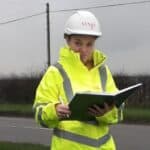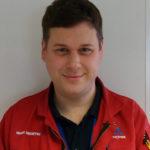Profile
Alexander Munnoch
-
About Me:
I live with my wife and 3 year old daughter North of Glasgow. I enjoy problem solving (why I got into science and engineering), playing football, guitar (heavy metal), piano and computer gaming.
-
Read more
I enjoyed every subject at school but had a talent for STEM subjects. Despite it being my worst science at school, chemistry was my favourite as I was really into understanding materials and solids.
I studied at the University of Glasgow for both my degree and doctorate in chemistry (catalytic chemistry) giving me a taste for industrial processes. After my PhD, I moved into industry with Johnson Matthey in the North East of England.
-
My pronouns are:
He/him
-
My Work:
I design solid materials and design/improve the ways to making them.
-
Read more
I’m currently working on measuring powder properties and using the measurements as a basis for designing and selecting industrial handling equipment.
My team puts focus on a process called spray drying (which is about making sprays and drying the fine droplets to produce powders). This can mean working on very small scales myself (barely visible – e.g. studying rates of drying of single droplets) all the way up to how that drying rate affects how well a process works at a multi-metre pilot-scale. This also means working with a wide range of other people on things at high temperatures, high pressures, with toxic gases and also of personal protective equipment.
In the recent past, I worked on how to safely and reliably improve the scale-up of lab-based experiments and processes to pilot-scale (think of going from equipment that fits on bench-tops to equipment that can barely fit within rooms).
In the past I have also done in-depth work on materials called zeolites (derived from the Latin for boiling stone (zeo-lithos) because of the amount of water they can hold and visible amounts of steam are given off from them when heated) . They are very holey/porous solids that act as both sieves and sponges/adsorbents. They can be natural or man-made and can be used in cement, food, catalytic converters and gas purifiers, fossil fuel production, gas separation, nuclear clean-up, water detergents and water purifiers. Without them, the world would not be as it is today.
Picture of zeolites – faujasite and philipsite from www.zeolite-collection.eu.
The holey/porous structure of faujasite (if you zoomed in to the atomic level) from http://www.explainthatstuff.com/zeolites.html
-
My Typical Day:
I normally split my week in half between on-site experimental work (making materials, improving processes, health and safety assessments) and at-home (background reading, designing experiments, attending meetings and reporting).
In a normal working week, I usually work 8.30AM to 5PM.
Evenings I’ll cook dinner, spend time with my daughter and try to squeeze in exercise/music/gaming.
I have travel commitments in my current role meaning I need to travel internationally every quarter for 1-2 weeks at a time on top of more irregular UK-travel for university or manufacturing site meetings.
-
Read more
I never really have the same day twice because of the wide range of things I work on and because the work is long-term (usually spread over months and years) for all the different parts of Johnson Matthey. On a given day I might have some combination of:
- background reading (for example: academic articles, patents and previous reports on the work)
- safety assessments as I can be handling some very dangerous materials (toxic solids, liquids and gases) or working with hazardous conditions (high temperatures and pressures).
- Equipment use and maintenance – I work with dozens of different pieces of equipment at lab and pilot-scale (the size before industrial scale) for a wide range of chemistries = organic and inorganic as well as using physical chemistry to understand the processes.
- Analysis and characterisation of materials (e.g. elemental analysis, spectroscopy)
- Troubeshooting within my fields of expertise
- Project proposals
- University engagement to learn more
- Other – interviews, training, STEM activities, volunteering
-
What I'd do with the prize money:
I would put it towards engaging with disadvantaged pupils as everyone’s education and upbringing are unequal. Education gives you the tools to improve your quality of life both now and in the future.
-
Education:
Lennoxtown Primary (1992-1999) started at 4 y/o
Kilsyth Academy (secondary school 1999-2005)
University of Glasgow (degree and doctorate 2005 – 2013) – started at 17 y/o
-
Qualifications:
Standard grades:
- Art and Design, Chemistry, Computing, English, German, Maths, Modern Studies and Physics
Higher:
- Art and Design, Biology, Chemistry, Economics, English, Maths and Physics.
Advanced Higher: Chemistry
- Degree (2.1, B.Sc. Hons) in Chemistry from University of Glasgow
- Doctorate (PhD) in Chemistry from the University of Glasgow.
-
Work History:
Johnson Matthey:
- Solids Engineering Excellence Centre lead 2022-present
- Senior Scientist in SMART Manufacturing (current) 2019-2022
- Core Scientist: (Catalyst) Supports and Carriers (corporate R&D) 2016-2019
- Senior Scientist in base metal catalyst development (business R&D) 2014-2015
University of Glasgow:
- PhD Chemistry (Zeolite catalysis and inorganic binders). 2009-2013
- Zeolite O2-molecular sieving project, Summer 2012
- BSc. Hons. Chemistry, 2005-2009
-
Current Job:
Johnson Matthey:
- Solids Engineering Excellence Centre lead 2022-present
Particle engineering expert leading equipment use and people in projects both inside and outside of Johnson Matthey.
- Internally, this is working on heterogeneous (solid) catalyst manufacturing (powders, pellets, tablets, extrudates, coatings etc.).
- Externally, this is working with universities and pre-competitive industrial networks.
-
Employer:
Catalysing the Net Zero transition
- BioForming® from Virent and Johnson Matthey helps power the first 100% SAF transatlantic flight by a commercial airline | Johnson Matthey
- Hydrogen: ramping up to reach net zero | Johnson Matthey
- 1/3rd of all catalytic converters ever – to lower NOx and soot emissions from automotives.
Quick stats:
- 11,579 people
- 30+ countries
- 207 years old
- 1,300 scientists and engineers
- £3.9 billion sales
- 4 core businesses (Clean Air, Catalyst Technologies, Hydrogen Technologies and Platinum Group Metal Services)
-
My Interview
-
How would you describe yourself in 3 words?
Curious/open-minded/pragmatic.
What did you want to be after you left school?
I wanted to be a chemist (not the pharmacist kind) but felt I needed to learn more before I could figure out exactly what I liked. So I went to university to study chemistry.
Were you ever in trouble at school?
Nothing serious in school despite some of the company I kept. Most of my trouble was outside of school.
If you weren't doing this job, what would you choose instead?
Football player
Who is your favourite singer or band?
At the moment, a British band called Sikth.
What's your favourite food?
Caramel shortcake without a doubt.
If you had 3 wishes for yourself what would they be? - be honest!
To score the winning goal for Scotland against England, have virtuoso guitar ability and my old knees back (too many injuries!).
Tell us a joke.
Guy walks into a bar - ouch.
-






